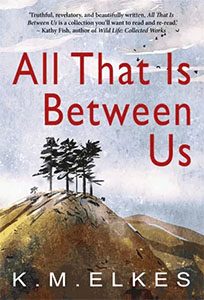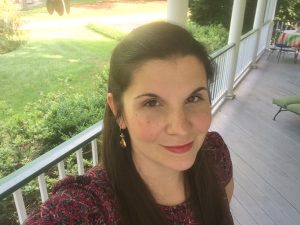
by Frannie McMillan
The 41 stories in K.M. Elkes’ latest collection, All That Is Between Us (Ad Hoc Fiction, June 2019), are helpfully grouped under three concise headings: “Parents and Children,” “Couples and Lovers,” and “Friends and Strangers,” but the simplicity ends there. Elkes explores these three categories of relationships with so fine a lens that nothing escapes notice. Elkes’ skill with words doesn’t come as a surprise given that his short fiction has been recognized by a number of international writing competitions, including the Manchester Fiction Prize, Aesthetica Creative Writing Award, and the Bath Flash Fiction Award. His work is widely published in journals and anthologies, and he is a 2019 recipient of an award from Arts Council England for his efforts to promote rural working-class stories about life in the U.K.
The first grouping of stories, “Parents and Children,” explores the complex dynamics of parenthood and childhood by beginning with a piece that wonders in second-person narration what might have been if the “you” in the story, a man named David, had made different choices as a husband and father (“Could Have, Would Have, Should Have”). From there, Elkes ranges back and forth between the perspectives of adult children reflecting on childhoods, giving equal play to both the good and the bad (“Biological,” “Giraffe High,” and “My Father, Who Ate a Tree”), to parents of young and adolescent children, addressing both the extreme challenges of parenthood and the breathtaking rewards of raising children (“Sisyphus and the Black Holes,” “On a Red-Eye Heading East,” “Swimming Lessons,” “Three Kids, Two Balloons,” and “Still Warm”). The most catching example of the paradox of parenthood is captured perfectly in “Sisyphus and the Black Holes,” where, after dedicating about two-thirds of the piece to describing the hardest parts of parenting, the story shifts to describe with perfect clarity: “[…] the prick-throated happiness when light lightly covers them, or the smell of their scalps, like a freshly cooked poem.” The final lines in this piece say, quietly, “They don’t tell you there has never been so much absence, as the absence when they are gone.” Elkes also offers space on the page to parents who have lost children and are learning to live in the wake of such great, unfathomable loss (“You Wonder How They Sleep,” and “Dissolved”). As the final piece in this section, “Dissolved” deftly swings the collection’s focus from families and children to romantic relationships and couplings of every caliber. The speaker and his wife are dividing their possessions, both briefly stumble over a child’s cup, talk about the rusting swing in the backyard, and weather a night of hard rain and flooding as the final tethers of their relationship dissolve in the shadow of the swing set.
In the “Couples and Lovers” grouping, Elkes delves into what happens when one half of a couple is lost, either tragically or after a relationship ends (“Jennifer’s Piano,” “The King of Throwaway Island,” “Boxers, Kids, Lovers,” “Busy Lizzy”). He also pokes fun at the idea of the “perfect” relationship or partner (“The Relationship Algorithms”). Additionally, Elkes’ pieces in this grouping unravel what it means when lovers play games like imagining absurd deaths, pretending to travel, or just avoid saying what they mean (“Fair Weather,” “Flabberjacks,” “Future, Tense,” “Paper Cuts”). These stories also hold up mirrors for readers to see themselves in the petty squabbles, the day-to-day grind that eats up love’s sweet magic over time (“Hard White Towns,” “Late Blackberries,” “Knowledge,” “The Way We Lie,” and “Dry Run”). Elkes also considers the not-quite-forgotten loves, the ghost ships of what might have been (“A Secret Weight,” “Manhattan, 2am,” “Hesperus is Phosphorus”), and what reader doesn’t carry around a secret love story, real or imagined, in that very way?
The book’s final section, “Friends and Strangers,” acknowledges both the endearing and bizarre quirks that make us human. Here, Elkes invites readers to examine, with great clarity but without judgment, how even solitary lives become entwined with others (“That Greta Garbo Woman and the Chrysanthemum Man,” “The Conservation of Angular Momentum,” and “Carapace”). The stories in “Friends and Strangers” are also about how people are shaped by their occupations, and how they are often consumed–literally and figuratively–by their jobs (“Extremities,” “Black Windows,” “Send Me Down,” and “The Good Guys”). Elkes’ writing possesses a distinct edge, a razor sharpness that doesn’t mince words but also doesn’t spare the aptly placed (and often humorous) detail, like when describing a speaker’s dead brother in “The Knock of the Broom” as “Tom, who moved to the country to paint his horrific landscapes, and settled for a heifer of a woman. He died politely at the wheel of his car on the way to the pub.” These characters are regular, working-class people. They aren’t executives, they don’t talk about retirement plans or fret over schedules. Their stories are equal parts comical, sad, weird, dark, and joyful.
Although each section features a specific type of human relationship, Elkes’ ability to create characters who are funny, insightful, and flawed is evident in every single one of these stories. The voices are varied, their worlds vivid and often hard to inhabit. Elkes breaks up this tough ground with well-timed humor or a story that isn’t quite so serious. His frequent references to the natural world–fruit, gardens, trees–soften the hard edges and remind readers that we all occupy the same Earth.
__________________________
 Frannie McMillan’s poetry has appeared in The Coachella Review, K’in Literary Journal, The Indianapolis Review, and others. She is currently at work on her first chapbook, You Ain’t By Yourself. By day, she connects young people with books as a secondary librarian in Richmond, Virginia. You can find her on Twitter @franniemaq.
Frannie McMillan’s poetry has appeared in The Coachella Review, K’in Literary Journal, The Indianapolis Review, and others. She is currently at work on her first chapbook, You Ain’t By Yourself. By day, she connects young people with books as a secondary librarian in Richmond, Virginia. You can find her on Twitter @franniemaq.

 In September 2022 SmokeLong launched a workshop environment/community christened SmokeLong Fitness. This community workshop is happening right now on our dedicated workshop site. If you choose to join us, you will work in a small group of around 15-20 participants to give and receive feedback on flash narratives—one new writing task each week.
In September 2022 SmokeLong launched a workshop environment/community christened SmokeLong Fitness. This community workshop is happening right now on our dedicated workshop site. If you choose to join us, you will work in a small group of around 15-20 participants to give and receive feedback on flash narratives—one new writing task each week.